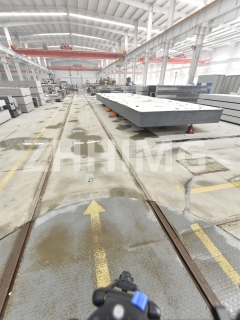CMM (coordinate measuring machine) has become an essential tool for precision measurement in various industries. Its accuracy and stability are the primary concerns of users. One of the key components of CMM is its base, which serves as the foundation to support the whole structure, including the probe, the measurement arm, and the software. The base material affects the CMM's long-term stability, and granite is one of the most commonly used materials for CMM bases due to its excellent mechanical properties.
Granite is a natural stone with high density, hardness, and stability, which makes it an ideal choice for CMM bases. Granite has a low coefficient of thermal expansion, making it resistant to temperature changes. This property allows the CMM to maintain its accuracy and stability even in harsh environments, such as a factory with a wide range of temperature fluctuations. Furthermore, granite's high stiffness and low damping result in decreased vibrations, enhancing the CMM's precision measurement.
The hardness of granite, which is rated between 6 and 7 on the Mohs scale, contributes to the CMM's long-term stability. The granite base's hardness prevents any deformation or warping, ensuring the CMM's accuracy over an extended period. Additionally, granite's non-porous surface reduces the likelihood of rust or corrosion, which can damage the base and compromise the CMM's stability. This characteristic also makes granite easy to clean, which is crucial in maintaining the CMM's precision and accuracy.
Another point to consider is that CMM's stability is not only affected by the base material's mechanical properties but also by how the base is installed and maintained. Proper installation and regular maintenance are critical in ensuring the CMM's long-term stability. The base must be level and secured onto a sturdy foundation, and the base surface should be kept clean and free of any debris or contamination.
In conclusion, the hardness of the granite base significantly affects the CMM's long-term stability. Using granite as the base material provides the CMM with excellent mechanical properties, including high density, stiffness, and low damping, resulting in decreased vibrations and enhanced precision measurement. Additionally, granite's non-porous surface reduces the likelihood of rust or corrosion and is easy to maintain. Proper installation and regular maintenance are also crucial in ensuring the CMM's stability and accuracy. Therefore, choosing a granite base for CMM is a wise choice due to its beneficial properties and long-term stability.
Post time: Mar-22-2024

